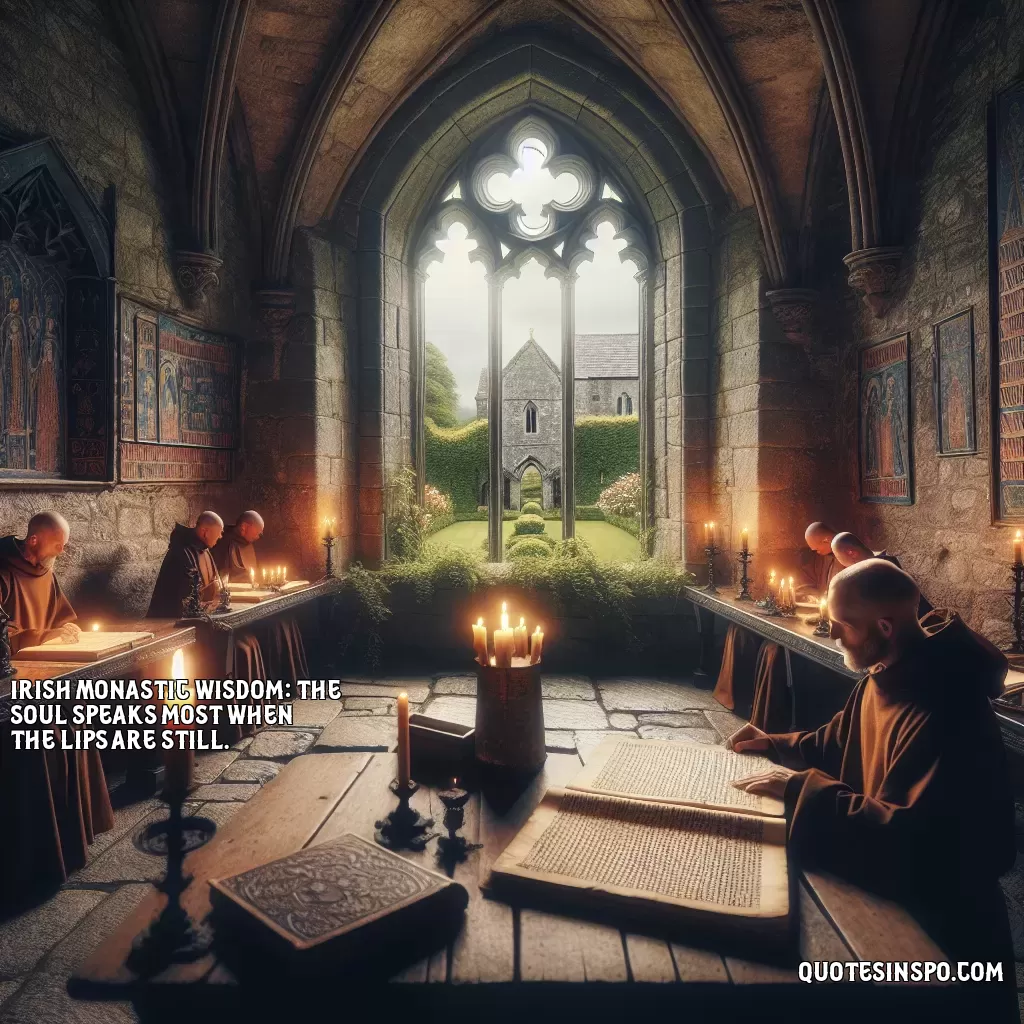
Irish Monastic Wisdom: The soul speaks most when the lips are still.

Irish Monastic Wisdom: The soul speaks most when the lips are still.
The quote "The soul speaks most when the lips are still" attributed to Irish Monastic Wisdom, encapsulates the profound belief that true insight and understanding often arise from inner silence rather than verbal expression. This notion hinges on the idea that the soul, representing our deepest self or essence, communicates most effectively when it is not drowned out by the constant chatter of speaking. In many spiritual traditions, silence is seen as a pathway to deeper self-awareness and enlightenment. By cultivating silence, individuals create space for introspection and contemplation, allowing them to connect more deeply with their true nature, desires, and values. When the lips are still, one is free from the distractions and superficialities of conversation, which often focus on mundane matters. In silence, our innermost thoughts, feelings, and intuitions have the opportunity to surface, providing clarity and insight that might otherwise be inaccessible. Moreover, silence can act as a powerful tool for meditation and reflection, practices frequently emphasized in monastic life. Monks and spiritual seekers often engage in periods of silence to detach from worldly concerns and attune themselves to spiritual realities. This silence becomes a canvas on which the soul can project its wisdom and truths. In essence, the quote encourages a retreat from external noise, advocating for the idea that in moments of quietude, we can hear what our inner selves have been yearning to express. It suggests that by quieting the mouth, we amplify the voice of the soul, leading to greater inner peace and understanding.
Quote By: Seamus Heaney
Seamus Heaney, born on April 13, 1939, in County Derry, Northern Ireland, stands as one of the most significant poets of the 20th century. Heaney grew up in a rural farming community, which deeply influenced his writing and thematic focus. His early experiences with nature and the land in which he was raised would later shape much of his poetic imagery. Heaney was educated at St. Columb's College in Derry and subsequently studied English language and literature at Queen's University Belfast, where his passion for poetry began to flourish.
Heaney published his first major collection, "Death of a Naturalist," in 1966, which brought him immediate acclaim and established him as a leading voice in contemporary poetry. This collection reflects his childhood and rural upbringing, exploring themes of identity, nature, and the complexities of growing up. His ability to articulate the beauty and brutality of the natural world earned him widespread recognition, and Heaney's work often delved into the nuances of human experience, particularly within the context of the political turmoil in Ireland.
Throughout his career, Heaney produced numerous celebrated works, including "Door into the Dark," "North," and "The Spirit Level." Heaney's poetry is characterized by its lyrical quality, profound imagery, and deep philosophical engagement with history and personal memory. In 1995, he was awarded the Nobel Prize in Literature, a testament to his impact on the literary world and his ability to convey the human condition through language.
In addition to poetry, Heaney was an accomplished translator and playwright. His translation of the Old English epic "Beowulf" is particularly noteworthy, as it reintroduced the ancient work to a contemporary audience with remarkable clarity and vigor. Throughout his life, Heaney remained deeply connected to his Irish heritage and the themes of loss, conflict, and reconciliation that pervaded it.
Seamus Heaney passed away on August 30, 2013, but his legacy endures. Heaney's work continues to inspire readers and writers across the globe, as he remains a vital figure in the landscape of modern poetry. His exploration of language, culture, and humanity ensures that Seamus Heaney’s contributions will resonate for generations to come.